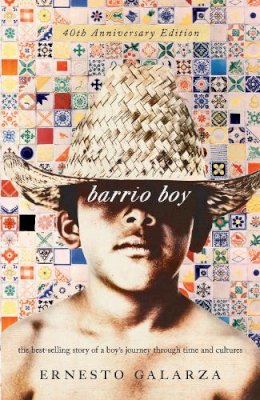11%OFF
Stock image for illustration purposes only - book cover, edition or condition may vary.
Holt McDougal Library: Barrio Boy
Ernesto Galarza
FREE Delivery in Ireland
Description for Holt McDougal Library: Barrio Boy
Paperback. Num Pages: 307 pages. BIC Classification: JFSL3. Category: (G) General (US: Trade). Dimension: 229 x 152 x 21. Weight in Grams: 467.
Journey with Ernesto Galarza through time, place, and culture in this stunning memoir of Mexican American identity and acculturation.
Barrio Boy is the remarkable story of one boy's journey from a Mexican village so small its main street didn't have a name, to the barrio of Sacramento, California, bustling and thriving in the early decades of the twentieth century. With vivid imagery and a rare gift for re-creating a child's sense of time and place, Ernesto Galarza gives an account of the early experiences of his extraordinary life—from revolution in Mexico to segregation in the United States—that will continue to ... Read moreengage readers for generations to come.
Since it was first published in 1971, Galarza’s classic work has been assigned in high school and undergraduate classrooms across the country, profoundly affecting thousands of students who read this true story of acculturation into American life.
The 40th anniversary edition of this best-selling book includes a new text design and cover, as well an introduction by Ilan Stavans, the distinguished cultural critic and editor of the Norton Anthology of Latino Literature, which places Barrio Boy and Ernesto Galarza in historical context.
Show Less
Product Details
Place of Publication
Notre Dame IN, United States
Shipping Time
Usually ships in 7 to 11 working days
About Ernesto Galarza
Born in Jalcocotán, Nayarit, Mexico, Ernesto Galarza (1905–1984) was a civil rights and labor activist, a scholar, and a pioneer during the decades when Mexican Americans had few public advocates. When he was eight, he migrated to Sacramento, California, where he worked as a farm laborer. One of Stanford's first Chicano alumni, Galarza received an M.A. in 1929, and a ... Read morePh.D. in history from Columbia University in 1944. He returned to California where, during the 1950s, he joined the effort to create the first multiracial farm worker union, which set the foundation for the emergence of the United Farm Workers Union of the 1960s. His books most notably include the 1964 Merchants of Labor, on the exploitation of Mexican contract workers, and the 1971 Barrio Boy. In 1979, Dr. Galarza was nominated for the Nobel Prize in Literature. Show Less
Reviews for Holt McDougal Library: Barrio Boy
“In 1971, at the age of sixty-six, the labour activist, educator and scholar Ernesto Galarza (1905-1984) published Barrio Boy, a memoir of the long migration of his family from a small village in the Sierra Madre to California. Barrio Boy immediately became a classic of Chicano literature, and on its fortieth anniversary has now been published in a new edition ... Read morewith an introduction by the critic, biographer and short-story writer Ilan Stavans.”—TLS “Galarza’s book is about growing up—first in Mexico, then in America. To this reader, it is on the same artistic level as Black Boy or Call It Sleep or even Huckleberry Finn. . . . As with Wright and Roth and Twain, we are given a near-perfect tale of rising from absolute poverty to middle-class security, but instead of a woeful recounting, it is filled with the joy of discovery: from living in the lively muddy streets of a small village in Nayarit to surviving, wide-eyed, in the lively and noisy barrios of Sacramento.” —RALPH: The Review of Arts, Literature, Philosophy and the Humanities “The 40th anniversary edition of Galarza’s book [is] now a standard text in high school and college classrooms.” —Occidental College “A useful introduction by Ilan Stavans and Galarza’s original preface accompanies this fortieth-anniversary edition of Barrio Boy. The book is well known within Chicano literary scholarship. It belongs to the genre of autobiography, certainly an empirical genre, a form of personal history, but also a self-portrait, a story that may serve as an example for readers.” —Journal of American Ethnic History "Galarza’s classic speaks louder now than when I read it as an undergrad in 1970 during the early formation of Chicano Studies at UCLA. The novel’s triple metaphors of the rooster versus the vulture, the boy versus the bull and the village versus the city braid into a whip of power in bold relief—colonization, displacement and exploitation. The painful transitions from the familiar to the strange and from the harmonies of the village to the existential vacuums of the metropolis are given to us to re-consider and behold—brutal forces that may have gained momentum in our millennium. Yet, there is fragile beauty, inescapable synthesis, and leadership burning out of a new voice shifting between home and homeland. You must take this book and treasure it, walk with it, converse with it and carry its most human story in your heart—so you will live and act fully. A cultural classic yesterday, a riveting, fiery illumination today." —Juan Felipe Herrera, former U.S. Poet Laureate "To re-encounter Barrio Boy by Ernesto Galarza is to indulge in deja vu from the early Chicano Movement concerns about acculturation and identity construction. The genuine story about a boy's journey reminds many of us of our own trajectory and how we had to negotiate a new ethnic self. The lessons are moving and heart-warming as markers of a collective perseverance and survival. The story embodies a key phase of immigration when the barrio becomes our first community to embrace or overcome. After all is said and done, the 'barrio boy' stays true to himself as an apprentice to Americanism without sacrificing his origins. He proves that being bicultural and bilingual are positive qualities worthy of upholding." —Francisco A. Lomeli, University of California, Santa Barbara Show Less

